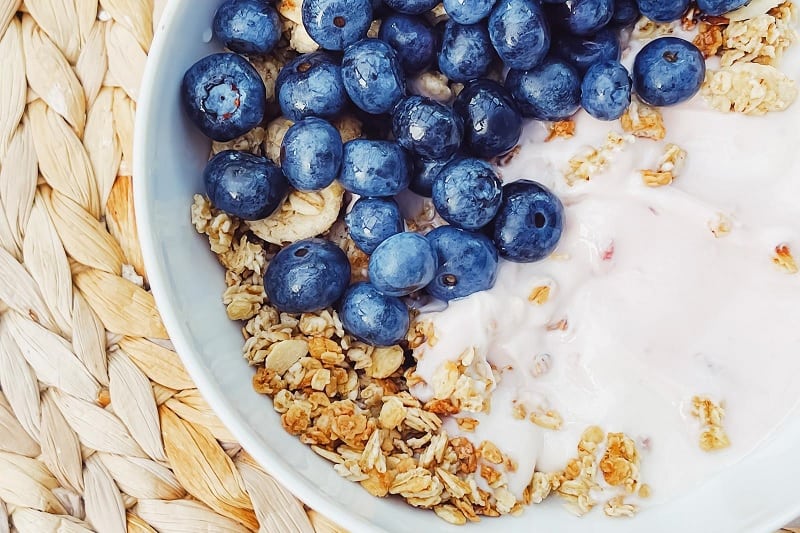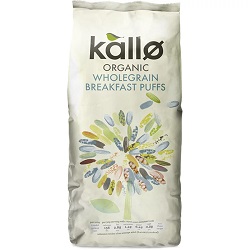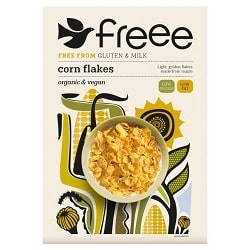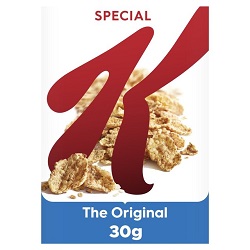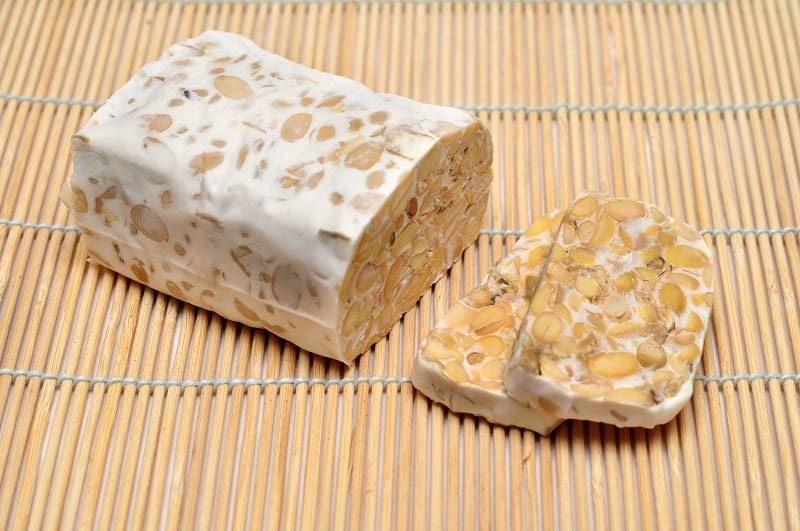It’s estimated that around 500 million kilograms of breakfast cereal is eaten in the UK each year. We eat so much that entire aisles are dedicated to this crunchy breakfast item at many large British supermarkets.
Finding a genuinely healthy cereal among a sea of sugar-filled cereal boxes can be a struggle. Take a look below to see if your favourites are as healthy as you think!
By looking at the amount of fat, saturated fat, sugar and fibre in each cereal product, we can compare their nutritional value and make a reasonable estimation of how healthy each cereal is.
Cereals with higher fibre content and lower sugar and saturated fat content receive better scores in our rating system.
Fibre does not provide energy but it does promote a healthier digestive and circulatory system. Breakfast cereals that are low in dietary fibre receive lower scores.
If you’re struggling to find a nutritious, healthy cereal that’s suitable to your tastes and price range, consider using the Naturaler Healthiest Cereal Score of each cereal to help you choose.
We’ve compared the following popular British cereals in this nutrition comparison article: Weetabix, Shredded Wheat, Rice Krispies, Shreddies, Cheerios Honey, Frosties, Rude Health Puffed Spelt, Eat Natural Protein Granola Almonds, Seeds & Honey, Special K, Krave Chocolate & Hazelnut, Free Cornflakes, Kallo Wholegrain Puffed Rice and Dorset Cereals Oat Granola.
| Brand | Calories (kcal) | Fat (g) | Saturated Fat (g) | Sugar (g) | Other Carbohydrates (g) | Protein (g) | Fibre (g) | Score (out of 10) |
|---|---|---|---|---|---|---|---|---|
| Shredded Wheat | 360 | 1.7 | 0.5 | 0.7 | 66 | 12.2 | 12.2 | 10 |
| Rude Health Puffed Spelt | 364 | 1.7 | 0.3 | 2 | 64 | 16 | 9 | 9 |
| Shreddies | 364 | 1.5 | 0.3 | 12.5 | 57.9 | 10.8 | 12 | 9 |
| Weetabix | 362 | 1.4 | 0.6 | 4.2 | 64.8 | 12 | 10 | 8 |
| Kallo Wholegrain Puffed Rice | 376 | 1.5 | 0.5 | 0.7 | 80.3 | 7 | 3 | 7 |
| Freee Gluten Free Cornflakes | 385 | 1 | 0.1 | 0.1 | 83.8 | 8.9 | 1.9 | 6 |
| Rice Krispies | 389 | 0.8 | 0.4 | 7.9 | 78.1 | 7 | 2.9 | 6 |
| Special K | 392 | 1 | 0.3 | 15 | 69 | 8 | 6 | 6 |
| Cheerios Honey | 380 | 3 | 0.8 | 22.3 | 51.1 | 8.7 | 8.5 | 5 |
| Dorset Cereals Oat Granola | 442 | 14.7 | 1.7 | 16.5 | 46 | 8.7 | 5 | 3 |
| Eat Natural Protein Granola Almonds, Seeds & Honey | 512 | 25.9 | 6.2 | 12.1 | 22.2 | 18.4 | 6.5 | 3 |
| Frosties | 375 | 0.5 | 0.1 | 37 | 50 | 4.5 | 2 | 2 |
| Krave Chocolate & Hazelnut | 453 | 11.2 | 3.8 | 26 | 45 | 6.6 | 3.7 | 1 |
The Naturaler Healthiest Cereal Rating score is calculated using the fat, saturate, fibre and sugar values in the table above, taken from the product packaging of each cereal listed. Breakfast cereal products are ranked by relative healthiness, using the EU Nutrition & Health Claims Regulation legislation (EC) 1924/2006 as reference. Naturaler provides this article and its data for reference only – it is not a substitute for proper medical advice.
The Healthiest Cereals in the UK
1. Shredded Wheat
Grain Type: Wheat
Naturaler Healthiest Cereal Score: 10/10
Shredded Wheat was developed in the 1890’s by American businessman and devout vegetarian Henry Pesky.
His method of turning raw wheat into crunchy cereal, without adding other ingredients, has remained almost unchanged since Shredded Wheat’s conception over 100 years ago.
Each pillow-shaped Shredded Wheat contains 100% Whole Grain Wheat. It has a slightly savoury taste with a hint of sweetness. This is because of its high natural carbohydrate content, averaging 66g per 100g of shredded wheat.
Currently, Shredded Wheat is made in Hertfordshire by Nestlé UK. Each box of Shredded Wheat sold in the UK is made from wheat grown, harvested and processed on British soil.
Some farmers that are partnered with Nestlé UK use regenerative farming. This is a land management process that captures CO2 from the atmosphere using natural techniques.
This cereal has been gulped down by Britons for decades. Despite having American roots, it has become a quintessentially British breakfast. Shredded Wheat was first marketed as a so-called “digestion aid” in Victorian times.
Modern research supports this claim. Shredded Wheat is very high in dietary fibre. Consuming high-fibre foods regularly can support digestion and increase how full we feel after eating.
According to the NHS, fibre consumption may also decrease the risk of developing bowel cancer, heart disease and similar, life-changing disorders.
Overall, Shredded Wheat ranked the highest in our cereal comparison, achieving the highest possible Naturaler Healthiest Cereal Score of 10 out of 10.
2. Rude Health Puffed Spelt
Grain Type: Spelt
Naturaler Healthiest Cereal Score: 9/10
Rude Health was founded in 2005. They make a range of breakfast cereals aimed at health-aware consumers. Each of their cereals often features a single ingredient like spelt, brown rice or wheat. The cereal’s cardboard outer box and inner bag are both fully recyclable.
This breakfast cereal contains only one ingredient: wholegrain spelt. Spelt is relatively uncommon in the UK. It’s often confined to artisanal breads and cereals, but this hasn’t always been the case.
For much of Britain’s history, spelt was been cultivated as a staple grain. Archaeology has revealed that the crop has been grown on British soil since at least 2,000 BCE.
To make this cereal, the individual grains of spelt are toasted until the water locked within each grain of spelt turns to steam, causing the spelt flakes to puff up like popcorn.
The end result is light and airy flakes of puffed spelt – they have a texture similar to Coco Pops or Rice Krispies and provide a slightly nutty flavour.
No sugars or other ingredients are added, giving Rude Health Puffed Spelt a Naturaler Healthiest Cereal Score of 9 out of 10. Our research indicates that this is a healthy, unique cereal.
3. Shreddies
Grain Type: Wheat
Naturaler Healthiest Cereal Score: 9/10
Shreddies are 96% whole grain by weight. Because of this, they’re packed with lots of heart-healthy fibre. They are currently made in the UK, but were invented in Ontario, Canada almost 100 years ago.
Shreddies have a unique square shape made from four, stacked layers of wholegrain wheat. This stacking helps the cereal to keep its shape in the box without breaking apart, and has the added benefit of soaking up milk like a sponge!
The breakfast cereal is fortified with iron and B vitamins: riboflavin (B2), niacin (B3), pantothenic acid (B5), vitamin B6 and folic acid (B9).
Shreddies are a high-fibre breakfast option. Fibre is an important aspect of any healthy diet and a 100g serving of this cereal will supply your body with 12g of fibre and protein respectively, more than most cereals ranked in this comparison list.
Each box of Shreddies does contain both sugar and invert sugar syrup, providing 12.5g per 100g, a typical amount for a popular breakfast cereal.
However, the amount of fat and saturated fat is tiny in comparison with other brands. A 100g portion of Shreddies contains just 1.5g of fat and 0.7g saturated fat. That’s slightly lower than many of the cereals listed here.
Plain Shreddies are the healthiest in terms of nutritional food energy. Frosted and chocolate flavoured versions are also available, but they contain a lot more sugar.
4. Weetabix
Grain Type: Wheat
Naturaler Healthiest Cereal Score: 8/10
Have you had your Weetabix? According to our research into its nutritional content, the answer is hopefully yes.
Weetabix is produced without any genetically modified ingredients using 100% British-grown wheat.
It’s a popular high-fibre breakfast cereal with a mild taste and extremely crunchy texture that quickly becomes soft in milk.
As well as wholegrain wheat, Weetabix contains small amounts of salt and sugar to increase the cereal’s tastiness.
Malted barley extract is used as a natural sweetener. Compared with other cereals on our list, Weetabix is low in sugar, containing 4.2g per 100g.
Weetabix is the UK’s most popular cereal. It accounts for 8% of all cereal consumed in the UK each year.
Weetabix Ltd, the company which produces Weetabix, is contracted to supply own-brand cereal items to many British supermarket chains.
Like many cereals, Weetabix is fortified to increase its nutritional value. It contains added thiamin (vitamin B1), riboflavin (vitamin B2), niacin (vitamin B3), folic acid (vitamin B9) and iron.
Our research indicates that Weetabix is a healthy, British breakfast cereal. It received an overall score of 8 out of 10.
Compared with other cereals, Weetabix is low in sugar, low in fat and fairly low in saturated fat. By weight, this cereal is 10% fibre. These reasons combined make Weetabix a healthy cereal option.
5. Kallø Wholegrain Puffed Rice Cereal
Grain Type: Rice
Naturaler Healthiest Cereal Score: 7/10
Kallø is an organic and natural food brand that specialises in healthy snacks and cooking ingredients. They use rice, corn and lentils in place of more conventional ingredients like wheat and oats.
The brand has a quintessentially Nordic feel, which is reflected in their name and simple product packaging. Kallo is owned by the Dutch company Ecotone but their products are made in Surrey, England.
Wholegrain rice is naturally low in fat and practically free from saturated fats. It’s healthier than white rice, which is lighter in appearance as it’s milled to remove its bran, husk and germ. These areas of the rice grain contain almost all of its vitamins, minerals and other healthy compounds. Wholegrain rice is unmilled, and therefore higher in nutritional value.
A 100g serving of Kallo Wholegrain Puffed Rice Cereal contains 0.5g of saturated fat. This product is unsweetened and naturally low in sugar, averaging just 0.7g sugar per 100g serving.
No ingredients other than 100% organic wholegrain rice are used – that includes additives, preservatives and colourants. This natural healthy cereal is free from gluten and salt, according to the manufacturers. It’s also free from genetically modified ingredients and doesn’t contain MSG or other flavour enhancers.
Overall, Kallo Wholegrain Puffed Rice Cereal gets a final score of 7 out of 10. It contains very healthy, low amounts of sugar and fat, but does not contain enough fibre to receive a higher score.
6. Freee Organic Corn Flakes – Gluten Free
Grain Type: Maize
Naturaler Healthiest Cereal Score: 6/10
Most breakfast cereals are made from starchy grains – these include wheat, rye, oats and barley. Each of these ingredients contain some level of gluten.
Approximately 1 in 100 Britons have coeliac disease, severely limiting the range of popular breakfast cereals available to them.
This cereal, produced by Freee, is made with maize, a grain that’s naturally free from gluten. It’s approved by Britain’s leading gluten-free charity Coeliac UK and certified as a Soil Association organic product. Freee Cornflakes are Kosher and suitable for vegans.
Free Cornflakes are slightly thicker than other cornflakes. Customers have noted that this stops cereal soggy-ness as they remain crunchy for longer while submerged in milk.
No added sugars, artificial colourants or flavourings are included. Small amounts of salt, dried rice syrup and rice bran extract are included to improve flavour. These additional ingredients constitute less than 2% of the cereal.
This cereal receives excellent scores for its low fat, saturated fat and sugar content. However, Freee Gluten Free Cornflakes are low in fibre and receive a lower Naturaler Healthiest Cereal Score of 6 out of a possible 10 points.
7. Kellogg’s Special K Original
Grain Type: Rice, Wheat and Barley
Naturaler Healthiest Cereal Score: 6/10
Special K is a classic British cereal that’s been enjoyed by generations of British cereal eaters. The ‘K’ in the name apparently stands for Kathleen, the daughter of the Kellogg’s employee who invented this simple breakfast cereal.
Each flake of Special K contains 3 different grains: rice, wholewheat and barley. These are rolled together, toasted and flaked, producing a crunchy, nutritious cereal.
Special K contains a variety of B vitamins, vitamin D and two minerals, zinc and iron. There is enough iron contained within each Special K flake that a small magnet can be used to steer the cereal around in a bowl of milk!
Compared with other cereals on the list, Special K is very low in fat and saturated fat. It is however fairly high in sugar, at 15g per 100g portion.
Because of its high content of healthy grains, Kellogg’s Special K is high in complex carbohydrates. The human body can break down sugar quickly, so eating sugary foods can cause a rapid rise in blood sugar levels.
Carbohydrates are formed of many sugars molecules that are fused tightly together. Because of this, it takes more time for our digestive system to break down carbohydrates into useful food energy, causing a more gradual rise in blood sugar levels and increasing how “full” we feel after eating.
Special K contains the most carbohydrates of the cereals we’ve inspected; 69g per 100g to be exact. It provides a good amount of dietary fibre in each serving, as well as vitamins and minerals. This Kellogg’s classic receives a Naturaler Healthiest Cereal Score of 6 out of 10.
8. Rice Krispies
Grain Type: Rice
Naturaler Healthiest Cereal Score: 6/10
Rice Krispies were first aimed at health-conscious adults, but were quickly adopted by kids. This cereal was the first ‘talking cereal’, a term that describes the distinctive “Snap, Crackle and Pop” sound that’s made when milk is added to the cereal.
People who enjoyed this popular breakfast cereal in the 1970’s may recall Jonathon Ross making his TV debut advertising the product. A lot of things have changed since then and the Rice Krispies recipe is no exception.
In 2010, the amount of salt used was slashed by 30%. And since 2018, Rice Krispies have been produced with 30% less sugar than previously. It’s now fortified with Vitamin D to promote healthy bones and stronger teeth. These changes make the breakfast cereal healthier and more nutritious.
Rice Krispies are made without artificial flavours or colours. They’re high in carbohydrates and contain a relatively normal amount of sugar for cereals today; 7.9g per 100g.
However, Rice Krispies do contain noticeably less fibre than other cereals in our list, averaging just 2.9g per 100g. This is the second-lowest fibre content of the cereals compared by healthiness in this article.
9. Cheerios Honey
Grain Type: Oat, Wheat and Barley
Naturaler Healthiest Cereal Score: 5/10
Cheerios, which were initially called “CheeryOats”, are a staple British breakfast cereal. The unflavoured, unsweetened variety of Cheerios is discontinued in Britain and the EU, but can be purchased online from American retailers.
The closest alternative in terms of flavour and texture to the original Cheerios is Cheerios Honey. A multigrain variety and a low-sugar vanilla-flavoured variety are also available in the UK.
This product is 77% whole grain, being made from both whole grain oat flour, whole grain wheat and whole grain barley. Each little ‘O’ contains 9 vitamins, including vitamin D and vitamin C as well as calcium; this mineral is crucial in helping our nerves, teeth and bones function correctly.
As well as feeding the nation, this breakfast cereal has also played a surprising part in scientific research.
Eagle-eyed people may have noticed how some Cheerios stick together in a bowl of milk, while others seem to avoid other Cheerios. This phenomenon has been dubbed “the cheerios effect” and it has been cited in fluid dynamics research.
Cheerios Honey are free from artificial colours or flavours. They are a sweet cereal made with real honey, pure sugar and smaller amounts of invert sugar syrup and molasses; these decrease the healthiness of Cheerios as pure sugar has little nutritional value.
10. Dorset Cereals Oat Granola
Grain Type: Oat and Rye
Naturaler Healthiest Cereal Score: 3/10
As the name suggests, this granola is made in Dorset, England. The brand’s cereals are marketed towards adults and are packaged in smaller-than-average boxes featuring distinctive, simple packaging.
Dorset Cereals Oat Granola is mostly wholegrain oat flakes, containing 66g per 100g. It contains fewer grains, seeds and other healthy carbohydrates than most other cereals featured in this article.
The second most abundant ingredient in this oat granola cereal is golden syrup. An impressive 22% of this product is golden syrup (including partially inverted sugar syrup). With this much sugar packed into every serving, it’s easy to see why UK shoppers have fallen in love with this Dorset Cereal granola.
The UK health group Action on Sugar has singled-out Dorset Cereals in the past for downplaying the amount of sugar in their mueslis and granolas.
The group noted that unlike most cereal brands sold in UK supermarkets, this cereal lacked front-of-box nutritional information and a traffic light nutrition label printed onto the cereal box.
It is very high in both fat and sugar, two food groups that can have a negative impact on health when consumed excessively.
Dorset Cereals Oat Granola provides an average amount of fibre in each portion, but contains fewer complex carbohydrates than most other cereals on this list, standing at 46g carbohydrate per 100g. The cereal receives a low score of 3 out of 10.
11. Eat Natural Protein Granola Almonds, Seeds & Honey
Grain Type: Oats and Mixed Seeds
Naturaler Healthiest Cereal Score: 3/10
Eat Natural is a 100% natural British food brand. They manufacture two forms of oat-based products: breakfast cereals and breakfast bars. This granola cereal is flavoured with Almonds, Seeds & Honey using a variety of healthy ingredients.
By weight, 7% of each portion is almonds, a nut that’s high in magnesium and vitamin E. Three different types of seed are added to the granola mix: sunflower seeds, pumpkin seeds and a small number of linseeds.
This breakfast cereal is free from refined sugars, but still relatively high in sugar. Large amounts of honey and small amounts of dried shredded coconut are used to sweeten the granola.
By weight, 15% of this cereal is honey. This gives Eat Natural Protein Granola Almonds, Seeds & Honey an amazingly rich and sweet taste, at the expense of being less nutritionally balanced.
Eat Natural Protein Granola Almonds, Seeds & Honey contains more protein than any other cereal on this list. Seeds and grains are naturally low in protein, so pea protein is added in to improve this breakfast cereal’s nutritional content. Whole grain oats make up 26% of this cereal’s ingredients by weight.
This natural breakfast cereal is full of healthy grains, nuts and seeds. However, it pales in comparison with other cereals we’ve investigated as it is much higher in sugar than other cereals.
This Eat Natural cereal is low in heart-healthy fibre but extremely high in fat and saturated fat, containing considerably more than all other cereals on this list.
On average, a 100g serving of Eat Natural Protein Granola Almonds, Seeds & Honey will contain 25.9g of fat and an additional 6.2g of saturated fat.
It comes in last place on our list of healthiest cereals, receiving a Naturaler Healthiest Cereal Score of 1 out of 10.
12. Frosties
Grain Type: Maize and Barley
Naturaler Healthiest Cereal Score: 2/10
The cereal was the first ever sugar-coated cereal in the UK, launching in 1956. Over £1 million of sales were made from Frosties alone that year (that’s equivalent to over £23 million in today’s money!)
Frosties are made from flakes of corn (maize) instead of wheat. The sweet, crunchy coating of each Frosties’ flake is made from sugar, flavoured with small amounts of barley malt extract and salt.
This sugary cereal is fortified to increase its nutritional content: vitamins B1, B2, B3, B6, B9, B12 and D are added in during the production process.
Each 30g serving provides 50% of a UK adults’ recommended daily intake (RDI) of vitamin D and no additional ingredients, including preservatives or colourants, are used.
It’s not surprising that Frosties are very high in sugar, providing 37g of the white stuff per 100g serving of the cereal. They’re also extremely low in fibre, averaging just 2g per 100g. Frosties are the lowest-fibre cereal in this cereal healthiness ranking article!
As such, they receive a low Naturaler Healthiest Cereal Score of just 2 out of a possible 10 points.
13. Krave Chocolate & Hazelnut
Grain Type: Wheat, Oat and Rice
Naturaler Healthiest Cereal Score: 1/10
Krave is a pillow-shaped breakfast cereal that’s made with three different cereal flours: wheat, oat and rice.
This combination of ingredients creates the mild-flavoured, crunchy outer shell that surrounds a chocolate and hazelnut filling. Krave cereal can be enjoyed with milk or eaten dry for a tasty snack.
This particular variety of Krave cereal features a sweet chocolate and hazelnut filling. Hazelnuts are a very healthy food, packed with antioxidants and omega-3. However, the nuts make up just 1% of the cereal’s weight by volume.
The positive health effects provided the nuts is outweighed by the large amounts of sugar and fat included in the recipe.
Krave Chocolate & Hazelnut is made with three different types of oil, including palm oil. This dramatically increases the levels of fat and saturated fat in the cereal.
A 100g portion of Krave Chocolate & Hazelnut contains 3.8g of saturated fat and 11.2g of all other fats, more than most other cereals featured on this list.
To increase the cereal’s sweetness, both glucose syrup and sugar are used. Glucose syrup is a cheap, widely-available ingredient used across the food industry.
The syrup is cheaper than regular white sugar but provides little nutritional value. Frequent consumption of glucose syrup has been linked with poorer health outcomes. These factors decrease the nutritional value of Krave Chocolate & Hazelnut.
Per 100g, Krave Chocolate & Hazelnut contains 453 kcal. That’s more calories than all the other cereals on the list.
This tasty chocolate product is relatively low in dietary fibre (3.7g), high in fat (11.2g) and moderately high in saturated fat (3.8g). Each of these factors decrease the healthiness of this British chocolate breakfast cereal.
Overall, we’ve given Krave Chocolate & Hazelnut breakfast cereal a healthiness rating of just 1 out of 10.

Dylan Kitson is a freelance writer and researcher based in Brighton, England. He’s a passionate promoter of all things health, working with supplement companies, health & fitness blogs and consumer review websites.

